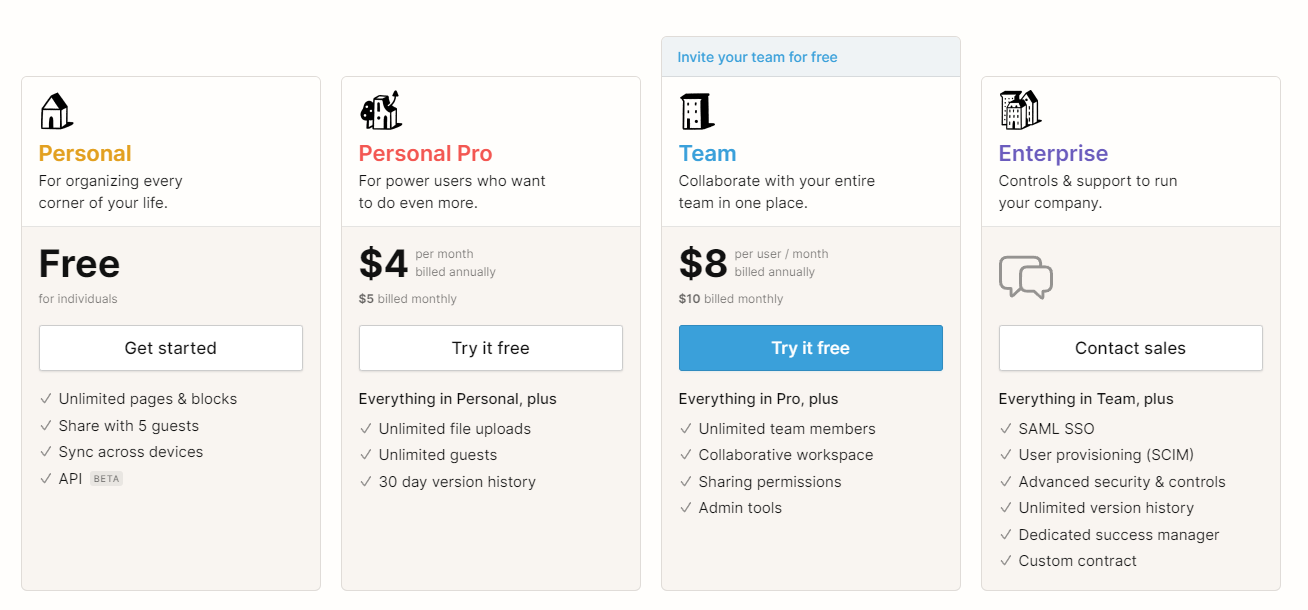Finding the perfect online collaboration and documentation tool has never been easy. There are plenty of things you have to consider when searching for one. Notion and Confluence are some of the best collaboration tools on the market today.
But which of the two should you choose when it boils down to having one? Here are some side-by-side comparisons to guide you through your decision.
1. Features and Design
Notion's features and design are outstanding. It allows you to incorporate a wide range of options and customize it as needed. It includes kanban boards, databases, and other Notion-specific features that Confluence does not have.
While Confluence is somewhat rigid and lacks the customization possibilities available in Notion, it does include several Atlassian products, including Jira and Bitbucket. As a result, if your team already utilizes these tools, Confluence may be the ideal solution since the shift would be painless.
Winner: Notion
2. Support and Training
Due to its advanced nature, it may be challenging for new users to learn how to use Notion. It has plenty of menus that can be somewhat confusing. So if you choose to go with Notion, you should prepare yourself to spend plenty of time and resources to educate your team members on how to use it.
On the other hand, Confluence is much simpler to use. It has a plain and straightforward interface that cannot overwhelm new users. In the long run, it saves both time and resources.
When it comes to support, they both stand at a tie with 24/7 support, live chat, among other essential support features.
Winner: Confluence
3. Interface
Notion manages to be the perfect balance between simplicity and functionality while maintaining an intuitive user experience that does not sacrifice ease of use. It's lighthearted, and it may take your team a very long time to get bored using Notion.
Although Confluence also has an engaging interface, Notion beats it in this regard.
Winner: Notion
4. Collaboration
Notion allows you to set up default collaboration on all of your tasks. This reduces the risk of conflicting tasks considerably. It will enable your team to collaborate on projects to get the greatest possible result.
Confluence, on the other hand, is less flexible than Notion when it comes to collaborative features. When dealing with collective documents, Notion offers greater flexibility.
Winner: Notion
5. Ease of Use
Even with its advanced wiki features, Confluence offers the best and intuitive user experience you will find in an online collaboration tool. Additionally, it allows you to edit your pages at any time, which is more than Notion.
When using Confluence, you can create content from anywhere by using the available templates. Notion, on the other hand, blocks limits formatting, making it much harder to implement future changes.
Winner: Confluence
6. Product Maturity
If you run a large business, you'll want a more established product. If that's the case, Confluence is the right app for you. It's been operational for 15 years now. With all of this time spent developing it, it's gotten a lot better in terms of features, productivity, and other factors.
On the other hand, Notion is relatively new to the market. However, with numerous innovative capabilities to help you collaborate more effectively, it becomes your finest choice as a collaboration tool. As a result of this, despite its youth, it attracts an enormous number of users to itself.
Winner: Confluence
7. Personal Use
When it comes to own use, Notion is a fantastic productivity software for your personal work. It's free for single users and offers an excellent platform to work on your projects and personal interests.
While Confluence is a great tool itself, it's more complex and has a lot of functions that may be superfluous in a private database.
Winner: Notion
8. Pricing and Availability
Both Confluence and Notion are free for everyone. However, both of them come with additional features that must be paid for. When it comes to price, Confluence is your best bet. It provides cost-effective solutions that are perfect for small teams. The discounts they provide allow large groups to use Confluence effectively.
For as little as $5 per month, you can access advanced confluence capabilities. Teams of 20 people may get Confluence for $100 per month. These prices are significantly lower than Notion's, which is $8 per user per month or $200 for a group of 20. Furthermore, you should be aware that Confluence is considerably more scalable than Notion.
Winner: Confluence
Notion vs. Confluence: Pros and Cons
Pros of Confluence
- Document Collaboration: Confluence is a centralized workspace that allows users to follow project progress in real-time. As a result, members can work efficiently on a project.
- Advanced Wiki Features: Users can use Confluence software to collaborate and document projects online. This is a Wiki feature that is widely recognized. In addition, the software's editor eases layout formatting containing a set of multimedia tools.
- Multiple plugin choices: Users can create extending applications that customize Confluence using plugins. These add-ons are used to customize features of Confluence and provide additional functionality.
- Advanced security features: Confluence allows you to control who has access and at what level. Because users do not need to log in to view public information, their information is kept safe.
- Compatibility with most Atlassian software: Atlassian is the company that created Confluence. As a result, Confluence is designed to work with other Atlassian software.
Cons of Confluence
- Mobile functionality is not as practical as web-based: Confluence is customized to fit the characteristics of a phone. However, there's a limit to the functionality of the phone platform.
- Expensive to use: Confluence, like most corporate software, charges a monthly fee to keep using its services. Despite a one-week trial option, consumers have to spend $10 and up after that.
- Poor search engine: The Confluence platform makes use of a search engine that has a low relevance rating. Confluence, in other words, provides insufficient information in response to a user's search request.
- Difficult to learn: Many users have noted that Confluence contains certain difficult-to-learn features. On the other hand, Atlassian has created many videos and textual instructions to assist users with their navigation.
Pros of Notion
- Free account: Notion provides personal users with a free account domain that they can access without paying a monthly fee.
- Excellent interface: Notion's user interface is clutter-free, with features that allow users to flexibly manage their work appearances.
- Advanced databases and tables: Users can open each row or column of a table on a different notion page. Notion also allows linking tables with separate forms of a database.
- Flexible documentation: Notion has tools that allow users to track and enable real-time updates of projects. Users can also record all changes of a project as they happen.
- Multipurpose: A user can add all forms of multimedia, save, arrange and use a database to organize all content.
Cons of Notion
- No eBook export: Unless you pay the highest subscription price, Notion will not allow you to download and share PDF-formatted notes. Furthermore, even if you are able to gain access to download the document, you will not get all features in your original document.
- Limited formulas: Notion will not work well if you feed formulas for large amounts of data. You may have to opt out if your job involves complex mathematical calculations.
- Does not support grouping in tables: Unlike other collaboration tools, Notion does not allow you to group the rows in your tables.
Other Alternatives
While Confluence and Notions are great productivity tools, you may want to consider other alternatives. There are plenty to choose from, depending on the needs and size of your organization. Follow this link to view some of the best tools in the market.
If neither Confluence nor Notion works for you, one of these surely will.
The Perfect Fit
The perfect fit for your company depends on the features you desire for your team. While Confluence will offer you excellent performance and scalable pricing, it is best for a big organization with a more rigid administration structure.
On the other hand, Notion will be ideal for smaller companies due to its flexibility and affordability. If you can't choose between the two, perhaps you should try both and see which one works best for you and your team.

.jpg)





